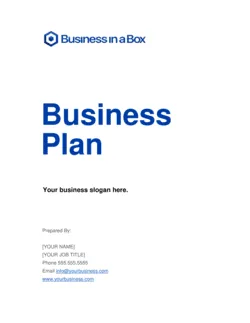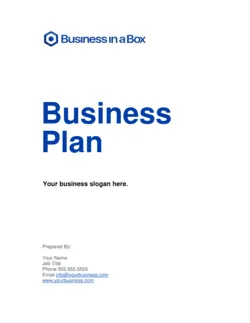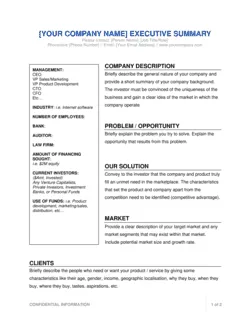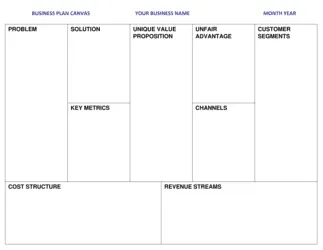Business Plan Templates Templates




Business Plan Templates: A Comprehensive Guide
Do you want to ensure that your business plan is carefully laid out? Worried that a poorly written plan will derail your startup?
You aren’t alone. Research shows that more than half of entrepreneurs were the sole investors for their future small business. Others worried that a sloppy plan might turn off potential investors or partners.
With so much on the line, even decisions as simple as choosing a business plan template can be overwhelming.
With so many options available for download, how can you decide which is right for your business? How can you know what your business plan template needs when you may not even know what to name your business?
Ask any experienced business leader: you don’t want to wade through the muck when planning a new business venture. You need as much time as possible to devote to your actual business- spending hours on formatting and outlining won’t get you closer to your dream.
Fortunately, you don’t have to have everything figured out to choose a worthy template. Our comprehensive guide will give you key tips and concepts about business plan templates. Before selecting one, though, let’s review the basics.
What is a Business Template?
A business template is a customized document that can be used to create a business plan. You can use one to flesh out complex business ideas and turn them into a formal document. Templates include basic formatting, simple designs, and professional headers with fillable blanks or empty space.
Business plan templates help you avoid blank-page syndrome: the shock that comes from trying to fill a blank page. Even the most established writers and business leaders need momentum when creating a business plan.
You can add or delete sections of the template at your discretion. You can choose from a number of plan templates ranging from investor memorandums to strategic operating plan templates.
Think of your business plan template as a personal guide leading you through the fog of the unknown. You can use a template to organize the ins-and-outs of business operations for startups or growing businesses. You can also use it to measure what you’ve accomplished against long-term goals.
Key Concepts:
Business plan templates help you actively visualize every aspect of your business.
The right business plan template should reveal the pieces your business idea might have been missing. Your business plan template should include the following:
- A user-friendly layout that works with most/all applications
- Space for an executive summary about you and your company
- An introduction outlining key sections of the plan
- Clear headers separating each section
- Unique verbiage about your industry and market
- Technical verbiage detailing legal aspects of your business
- Enough details to serve as a foundation for future documents
Why Start with a Business Template?
A business template can make or break your business launch. Much like making a recipe, a good final product often comes from a combination of sweat, finesse, and a framework passed down from one great mind to the next.
While a business plan is not necessarily a legal contract, it can create similar expectations. Investors look to business plans when creating the basis for future financial agreements. Banks look for specific information that builds trust between you and your lender.
You are more likely to launch or grow your business with a professional document with clear, actionable terms. A business template with the wrong (or not enough) information can lead to more headaches than help.
Fortunately, you don’t have to be an expert in formatting to create an amazing business template. You just have to choose a template that fits your specific needs.
Choosing a User-friendly Business Template
The first quality to look for when choosing business plan templates? A user-friendly layout. Whether you want a business plan template Word can handle or prefer more sophisticated online software, ease-of-use is still important. If a template isn’t user-friendly, entering even the most basic information will be a struggle.
When you first download a template, you want to be sure it’s compatible with all office suites. Otherwise, you might run into formatting issues before you even begin. Spacing could be thrown off if a template isn’t compatible with your processor.
The worst-case scenario: incompatible documents could be partially or completely unreadable. This is the nightmare no one wants to deal with when under pressure to submit a business plan.
You’ll also want the document to be a bit flexible when entering information.
For instance, you’ll need to change information to reflect your current industry. If you want to create a business plan for a restaurant, you’ll want to add information relevant to the restaurant industry. If you can’t enter unique industry information, your document may appear unprofessional or inaccurate.
Likewise, you might offer a specific product. This might mean including photos of your product, whereas a plan about broader services might need infographics in their place. You want to easily switch out headers and graphics without trouble.
How Much Customization is Enough?
Some templates come pre-filled, with the opportunity to change details and save. Others allow you to change the business type and add your own information. Our templates, for instance, come pre-filled with a certain amount of information based on your industry type.
An entrepreneur looking to start an accounting firm could open up our above template created by experts in their field. They would find an MS Word file type with Word-friendly formatting and pagination. The user could simply add relevant company information or make more changes if they wanted to do so.
Most users should choose a template that offers some customization, but not too much. The format should pretty much be there- it should look complete aside from the information you add. You can always fill the template out as-is and look it over before further customizing it.
Even with user-friendly templates, it’s smart to save a copy after filling out the basic information. That way, if you do make changes and decide to revert back to the original formatting, you have a version of the original ready to go. You can also duplicate the document halfway through if you want to be extra cautious.
Length of The Business Plan Template
A business plan can be anywhere from one page to 31 pages, if not more. You might need a shorter plan if it’s more for general records. If you’re planning to send it to an investor, you might need to include more information on your target market or industry trends.
The more in-depth your plan, the longer it can be.
Our templates come with everything you might need in your plan, from personnel plans to market analysis sections. If you don’t need a section, simply delete it. For a professional finished look, leave big headers at the top of the page. Small headers can overflow into the next page as long as the reader can easily flip through the plan.
If using a longer template, make sure it starts with an introduction and table of contents. That way, readers can find key terms and flip to the correct page. Busy business leaders may not have time to read every page of your plan, but they’ll want to get to the meat quickly.
If you have an idea for an app or other innovative technology, you need a template that allows you to add information as you develop your product. You might need to include information about new competitors or data management systems. If it isn’t clearly organized, the reader might get lost combing through the technical details.
Types of Business Plan Templates
The type of template you need depends on your next course of action. It also depends on who will read your plan. Look over the following end-goals when choosing a business plan template:
Testing the feasibility of a business idea: an honest evaluation of your current plan can tell you the likelihood of bringing your idea to fruition. You want to list any strengths, weaknesses, and opportunities your company faces. This plan can help you compete in your desired market.
Planning for the next growth phase of your business: whether you’re in the introduction phase or a growth phase, planning for the next steps can make growing your business easier.
Identify specific strategies and according benchmarks: this plan is great for entrepreneurs with a strong vision. Use this to break your vision down into measurable steps and streamline your operational responsibilities.
Determining the scope of your business endeavor: season pros and budding entrepreneurs alike can appreciate the value of sizing up your business. Understanding the kind of investment ahead is crucial for planning purposes. It can also help you decide what kind of business structure you need.
Seeking valuable partnerships: sometimes the best kinds of innovation come from unique partnerships. This plan should help convince a potential partner of your value to them and their business goals.
Seeking capital or borrowed funds: investors and banks (even friends and family) want to know what they’re getting into. This plan builds a foundation of trust and spells out the terms behind the funds.
If you aren’t sure what type of template you need, look at a few examples of plans completed by professionals. Did they include more information? Did they include a forward-looking statement for a specific audience?
While you don’t have to copy a finished template by any means, seeing the finished product can help you identify what to keep or delete in your template.
Sourcing Your Business Plan Template
The best templates are written by experts. Someone with in-depth knowledge on your industry knows what investors are looking for in a plan.
Lawyers and industry leaders can guide you through the critical points your plan should cover. Their understanding of acquisitions and startup requirements can get you actively thinking about what your business needs.
Above all, an expert can help make a long, detailed business plan look less overwhelming.
On the other hand, plans written by people with no knowledge of the industry or common pitfalls may offer a half-baked product. They may also be limited in the business types they cover.
You could end up with a plan that looks almost exactly like someone else’s, or one that was obviously filled in. This could make your plan seem poorly-thought out, even if you worked hard every step of the way.
Our Knowledge Goes Beyond Templates
If you want to become an expert on business plans but dread the idea of spending long nights with your head stuck in a book, you may benefit from a few educational resources. You don’t have to search for these at the library or online- we already have them ready for you!
Our free business plan guidebook take you through the steps an expert would follow when creating a business plan.
We condense knowledge on every aspect of business planning into small, easy-to-chew bites of information you can review over lunch or at the park- anywhere and anytime that works for you. You can even use these insights when customizing your business plan template!
With the help of experts and the right business plan templates, you can turn any idea into a sparkling, professional business plan! Sign up for access to a full template preview via our Businesses-in-a-Box toolkit. We’ll help you take your business to new heights!
